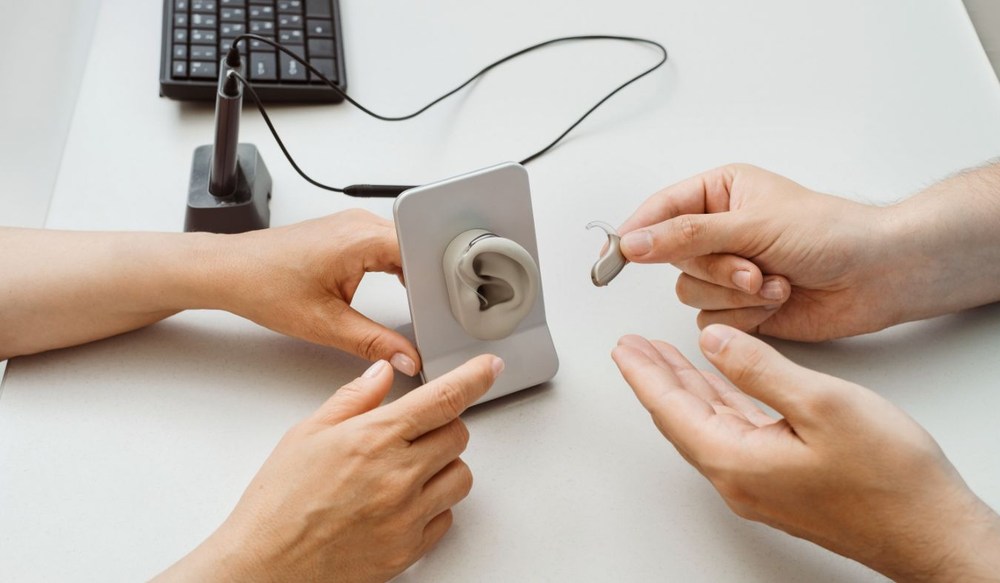Do I Need a Hearing Test? Screening Guidelines After 40
Most people don’t think about their hearing until they have to ask

By: admin | November 28, 2024
As autumn leaves start to fall and the air grows cooler, it’s worth thinking about the effects of the changing weather on your ears. Those crisp, windy fall days can surprisingly impact your hearing health. While most of us bundle up against the cold, we often overlook the need to shield our ears from those frosty gusts.
This isn’t merely about keeping comfortable during your autumn strolls. Protecting your ears from the cold is a crucial part of maintaining your overall hearing health, particularly if you’re already using hearing aids or managing hearing loss. By appreciating how the shifting seasons can influence our hearing, you’re better equipped to look after your hearing abilities as we transition from fall into the winter months.
As the cold weather of fall and winter sets in, your ears serve more than just a channel for sound. They become delicate structures vulnerable to harsh elements. The structure of your ear, especially the outer part, is incredibly sensitive to cold weather.
Your ear is composed of three sections: the outer ear, middle ear and inner ear. The outer ear or pinna, which is visible and touchable, is primarily made of cartilage and skin. This area lacks the fatty tissues that usually insulate other parts of your body against cold temperatures. As a result, it can be particularly prone to cold weather-related issues.
In addition, your eardrum can also be affected by severe cold weather. Cold air can cause contraction in your eardrum and surrounding tissues, leading to discomfort or temporary hearing difficulties.
Being conscious of these vulnerabilities provides a compelling reason to protect our ears when temperatures plunge. Simple actions like wearing earmuffs or hats that cover your ears can significantly contribute to maintaining good hearing health during the colder months.
As winter approaches, it’s not just the temperature that can impact your hearing health. The brisk, icy winds can also play a significant role. You may have noticed that during particularly windy days, you experience a sort of ‘wind noise’ or feel like your hearing is somewhat muffled. This happens because gusty winds can create a temporary barrier for sound waves, making it harder for them to reach your eardrum.
Additionally, exposure to cold winds can potentially lead to a situation known as “exostosis” or “surfer’s ear,” where abnormal bone growth occurs in the ear canal due to repeated exposure to cold and wet conditions. This growth can block the ear canal leading to frequent infections and potential hearing loss if left untreated.
So, when you’re stepping out on windy days, think about using protective gear like wind-resistant earmuffs or hats with ear flaps. These will not only keep you warm but also reduce wind noise and protect your ears from potential damage.
As the fall chill continues, it’s important to consider another potential threat to your hearing health: ear infections. Cold weather has an interesting link with an increased risk of these troublesome ailments.
The logic behind this is quite straightforward: cold weather can lead to the narrowing of your Eustachian tubes. These small passageways connect your middle ear to the back of your throat and play a vital role in maintaining equal air pressure on either side of your eardrum. When these tubes shrink due to cold, fluid can build up in the middle ear, creating a perfect breeding ground for bacteria and viruses that cause infections.
Ear infections can be painful and may temporarily affect your hearing. They are especially common in children but can occur at any age. So, staying warm isn’t just about comfort – it’s also about preventing conditions that could impact your hearing health. This is another reason why it’s so important to bundle up and protect your ears when temperatures drop!
You might notice an increase in ear congestion during the fall, especially as cooler weather and allergens like mold, pollen and dust become more prevalent. This congestion can lead to a feeling of fullness in the ears, muffled sounds or difficulty hearing clearly. If you experience any of these symptoms, it’s likely that your Eustachian tubes are affected, as they help regulate pressure in the middle ear. The change in humidity and temperature can also lead to fluid buildup, contributing to a sense of blockage.
Another common issue in fall is the worsening of tinnitus or ringing in the ears. Seasonal changes, like shifts in atmospheric pressure or increased exposure to environmental noise during outdoor activities, can trigger or intensify tinnitus for some individuals. If you’ve noticed that your tinnitus is louder or more persistent as the weather turns cooler, it may be a sign that your hearing is being impacted by these seasonal factors. Regular monitoring and communication with an audiologist can help you address these issues before they become more problematic.
Winter can pose challenges for hearing aid wearers, as the cold, moisture and fluctuating temperatures can affect the performance of hearing aids. However, with a few practical steps, you can keep your hearing aids protected and functioning optimally throughout the winter months.
One of the main issues in winter is moisture, whether from rain, snow or the humidity caused by indoor heating. Moisture can damage the delicate internal components of hearing aids, leading to malfunctions. To combat this, it’s essential to store your hearing aids in a dry place when not in use. Using a dehumidifying container or drying kit overnight can help remove excess moisture. You can also use hearing aid desiccants or drying capsules that absorb moisture.
Additionally, it’s important to protect your hearing aids from extreme temperatures. If you’re heading outside into cold weather, consider using a protective cover or earmuffs that fit over your hearing aids. This helps to shield them from the cold air and keeps them from becoming too cold, which could cause condensation when you move indoors. Keeping extra batteries on hand is also wise, as colder temperatures can reduce battery life. By taking these precautions, you can enjoy the winter season while keeping your hearing aids in top condition.
Choosing the right ear protection for autumn weather comes with its own set of pros and cons. On the plus side, it can help prevent conditions like exostosis, while also providing comfort against cold winds. However, the downside may include potential discomfort from prolonged wear or challenges in finding a style that suits personal preferences.
Understanding this topic brings several benefits. It helps in making an informed decision about which type of ear protection to choose based on individual needs and lifestyle. It also aids in realizing the importance of ear protection during colder months, not just for comfort but also for maintaining good hearing health. Knowledge about this can encourage proactive measures, leading to fewer hearing-related issues during autumn and winter seasons.
The arrival of autumn ushers in a season where our ears require a little extra care and attention. This need is particularly significant for those already managing hearing loss or using hearing aids. So, how can you ensure your ears stay warm and healthy this fall?
Firstly, always remember to wear earmuffs or hats that cover your ears when you step out into the cold. These simple accessories provide a shield against chilly winds and help maintain your ear’s temperature, reducing the risk of cold-related discomfort. Secondly, if you’re someone who experiences seasonal allergies, make sure they are well-managed during this time of year. Inflammation from allergies can increase sensitivity to cold wind and lead to other complications like ear infections or temporary hearing loss.
Lastly, don’t forget about professional advice! Audiologists can offer personalized recommendations on how best to protect your ears from the harsh autumn weather. They may suggest specific types of earmuffs or hats designed for maximum protection and comfort.
If you start experiencing hearing issues this fall, the first step is to consult with an audiologist. They can help determine whether your symptoms are related to seasonal factors, like changes in humidity, allergens or temperature, or if they’re linked to an underlying condition. A hearing test will provide valuable insight into any changes in your hearing and help guide the appropriate course of action.
In the meantime, managing symptoms at home can make a difference. If you’re dealing with ear congestion or fullness, using a saline nasal spray or a humidifier can help relieve nasal and Eustachian tube blockages. For those with tinnitus, managing stress levels and limiting exposure to loud sounds can help reduce the intensity of the ringing. Additionally, using dehumidifiers or drying kits for your hearing aids can help prevent moisture buildup that could lead to malfunctions. Taking these proactive steps, along with professional guidance, will ensure that your hearing health remains a priority throughout the fall season.
Taking care of your ears becomes especially important as temperatures drop and fall winds pick up. Understanding how cold weather affects your hearing and knowing the right ways to protect your ears can make a real difference in maintaining your hearing health during the colder months.
Have questions about protecting your ears from those chilly fall winds? The team at Great Lakes Bay Hearing in Midland, MI is here to help. Give us a call at (989) 941-0627 – we’ll work with you to find the right solutions that fit your lifestyle and keep your ears protected all season long. Don’t let the cold weather affect your hearing health – reach out today and let’s work together to keep you hearing your best.

Most people don’t think about their hearing until they have to ask
By: admin | January 19, 2026

Hearing aid design directly affects whether people actually use them. If a
By: admin | November 18, 2025

Many people expect hearing aids to provide clear hearing in every
By: admin | September 24, 2025
